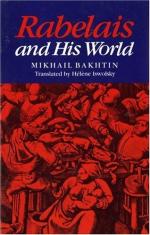
|
| Name: _________________________ | Period: ___________________ |
This quiz consists of 5 multiple choice and 5 short answer questions through Chapter 9, Chapter 3 - Popular-Festive Forms.
Multiple Choice Questions
1. Which aspect of Renaissance culture does Bakhtin stress is still apparent in Western society today?
(a) Public thrashings.
(b) Street cries.
(c) Clowns and fools.
(d) Carnival.
2. What are the targets of the abusive language in Rabelais' prologue to the Third Book?
(a) Average townsfolk who have imbibed too much wine.
(b) Members of the aristocracy whose political ideals are not in keeping with Rabelais' ideals.
(c) Representatives of old, hypocritical, serious Medieval philosophy.
(d) Foreign travelers who have offended the traditions of Carnival.
3. What are the "Catchpoles" of which Rabelais writes?
(a) People who earn money by allowing others to beat them.
(b) Vegetables which require being strung to a pole in order to grow.
(c) Animals sent into the wild as sacrifices.
(d) Materials used to build large meeting-houses.
4. According to Bakhtin, Carnival was the true symbol and incarnation of:
(a) The natural world.
(b) The sanctity of the Church.
(c) The folk festival.
(d) The power of the monarchy.
5. When the grotesque was revived in the Romantic era, what did it react against?
(a) Imaginative fantasy.
(b) The rediscovered works of Shakespeare and Cervantes.
(c) Neoclassical, rational, Enlightenment thought.
(d) Individual, sentimental ideas.
Short Answer Questions
1. What are the "intelligentsia"?
2. In Rabelais' time, why was the meaning of debasement often ambivalent?
3. What work of literature is parodied in the prologue of _Gargantua_?
4. How is the figure of the king treated in Rabelais' writing?
5. How did Rabelais obtain the material for his writings?
|
This section contains 373 words (approx. 2 pages at 300 words per page) |

|




